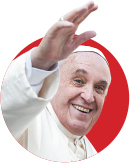The leader of the Roman Catholic Church has his hands full
The election of Pope Francis on March 13, 2013 involved a string of firsts – first pontiff from the Americas, first Jesuit pope, first non-European pope since the 8th century and the first to be named Francis. His remarkable election followed the stunning resignation of Benedict XVI, and soon after Pope Francis moved quickly into two more firsts – including women in the rite of foot washing and visiting an Anglican church in Rome.
Born Jorge Bergoglio in Buenos Aires in 1936, he became a priest in 1969, a Jesuit in 1973, a bishop in 1992, archbishop in 1998 and then cardinal in 2001.
Most of us hear universal acclaim for Pope Francis. Secular magazines recognize his power and influence. Forbes ranked him fifth in their 2016 list of the world’s most powerful people. He is often featured positively in The New York Times, Washington Post, The Globe and Mail and other major newspapers.
Like Pope John Paul II, Francis is given star status on television. When Pope Francis visited the United States in 2015, Vanity Fair called him the "people’s pontiff" and said he is one of "the most beloved people on the planet." His recent TED talk made all kinds of positive headlines.
One popular reason for admiration of Pope Francis has to do with his decision not to live in the papal palace, but in the Vatican guesthouse known as the Casa Santa Marta, a far humbler abode. His lack of pomp extends as well to his choice of vehicles, clothes and, most famously, his donning of a clown’s red nose while visiting a children’s charity.
 LEADING CONSERVATIVE CRITICS BELIEVE THE CATHOLIC CHURCH IS IN DANGER OF SCHISM DUE TO POPE FRANCIS.
LEADING CONSERVATIVE CRITICS BELIEVE THE CATHOLIC CHURCH IS IN DANGER OF SCHISM DUE TO POPE FRANCIS.
PHOTO: GIULIO NAPOLITANO / SHUTTERSTOCK.COM
His outward humility is matched by his care for the poor and his outreach to those marginalized from the Catholic mainstream. In this regard, Prime Minister Justin Trudeau asked the Pope to apologize for Catholic mistreatment of Indigenous people in Canadian residential schools.
Given his fame it’s hard to imagine Pope Francis could avoid being a target for intense critique. From the left, both Catholic and otherwise, there is anger Pope Francis is antiabortion, not supportive of women for the priesthood and not open to homosexuality as a moral path.
The most important attacks, however, come from leading conservative cardinals, bishops, priests and scholars who argue the Pope has broken or is in danger of breaking fundamental Catholic doctrine. These critics believe the Catholic Church is in danger of schism due to Pope Francis.
The most strife in his four years as Pope involves a document he released in April 2016. Critics allege Amoris Laetitia (Latin for The Joy of Love) reverses official teaching that divorced Catholics who remarry can take Communion.
There was instant objection over the document from 45 Catholic scholars, calls for clarification from hundreds of bishops and priests and, most significantly, in late 2016 four cardinals (led by American Cardinal Raymond Burke) wrote the Pope privately about five dubia (Latin for doubts) they had over his statements and asked for yes or no answers. They went public when he refused to answer, igniting new levels of controversy and intrigue.
The mainstream media, who love Francis, have even targeted Cardinal Burke for alleged contact with Trump aide Steve Bannon. Burke claims in an interview he doesn’t remember meeting Bannon.
Political machinations aside, this debate is monumentally important to Catholics, given their theological belief about the Eucharist. It’s also significant since it represents questioning about the unity of the Catholic Church, the infallibility of papal teaching, and (according to Burke) basic doctrinal integrity. Burke is on record as stating, "The Church is like a ship without a rudder," and that there might have to be a "formal public correction" of Pope Francis.
While Burke has been the object of the Pope’s discipline (mainly through demotion and avoidance), evangelical Christians have been recipients of the gentle and open side of Francis. When he was an archbishop in Argentina, he had regular meetings with evangelical pastors and asked repeatedly for prayer from them. He has some intense friendships with evangelical leaders and has invited Evangelicals of all stripes to the Vatican, most recently a group of Pentecostal leaders.
For Pope Francis, his positive engagements with non-Catholics (Protestants, Orthodox, Jewish, Muslim, Hindu, Buddhist, atheist) must serve as a welcome relief to the tempest inside the Catholic world.

James A. Beverley is professor of Christian thought and ethics at Tyndale, an evangelical seminary in Toronto. His PhD is from the Catholic University of Saint Michael’s College in Toronto.